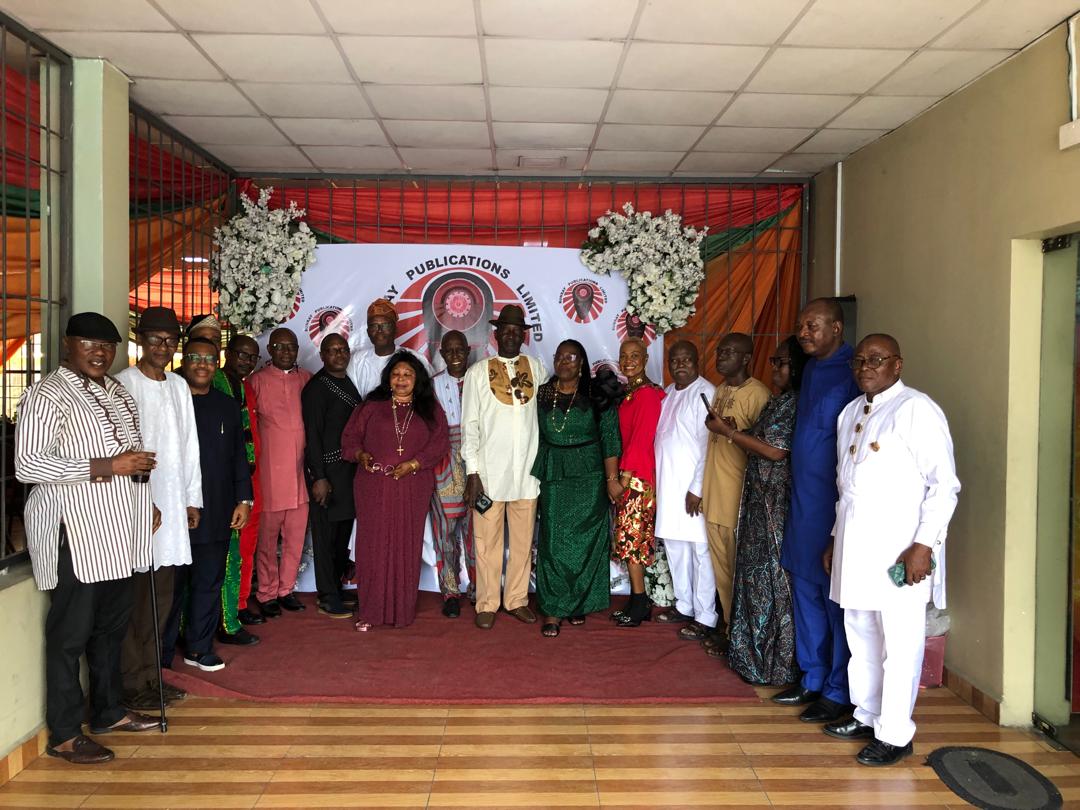News
Ex-Sunray Staff Hold Reunion 26 Years After

It was an exciting moment for former directors, managers and staff of the defunct Sunray Publications Limited yesterday when they gathered together in Port Harcourt for their first reunion since the company closed shop in 1998.
Sunray Publications Limited attracted global attention to Port Harcourt in 1992 when it began the publication of full colour daily newspaper in Nigeria, the first by a newspaper company in Nigeria.
It introduced a brand of journalism that focused on developmental journalism and kept high ethical standards for its journalists. It attracted top rated journalists and scholars from other media houses, universities and even blue chip companies. Both the newspapers and the journalists consistently won awards with their investigative stories and informed commentaries and cartoons.
The company was also a first choice graphics company that printed quality jobs for customers and ran a books publishing section that edited and published many books.
A combination of boardroom battles, political interference and marketing challenges however led to its closing down in 1998.
After the closure, many staff members of the company scattered and took up opportunities in other companies and establishments abroad. Many others also set up their private practices and became highly successful.
However, many other former workers passed on and were aptly remembered during the reunion.
Former Managing Director of Garden City Sunray Limited, Amaopusenibo Bobo Brown, who presided over the reunion, praised the resilience of former Sunray staff members even after the company closed down.
He noted that the fact that many of them went on with their lives and became huge success stories was a testimony that Sunray gathered the right people to execute the vision the promoters of the company had.
He urged the SUNRAY Family, as the group now call themselves, to always find a way of contirburing to the betterment of the society, saying that the Nigerian society was worse off now than it was when Sunray came in with a vision to support national development.
People that spoke at the Reunion included renowned political science scholar, Prof. Eme Ekekwe, who was the Chairman of the Editorial Board of Sunray and the pioneer Personnel Manager of the company, Dame Ngozi Pearse.
The Chairman of the Reunion Planning Committee, Dr. Gloria Ijeoma Aso, thanked members of the Sunray Family for the support they rendered to ensure that the reunion held successfully.
Members resolved that the reunion should henceforth be hosted annually in a bigger way that would include their family members. A special musical rendition was made by children of Mr. and Mrs. Canice Ezirim, both former staff members of Sunray.
Prominent among people that were at the reunion were Chief Ernest Chinwo, the General Manager of Rivers State Newspaper Corporation, publishers of The Tide newspaper; Chief Lawson Hayford, former General Manager of Bayelsa Radio; Mr. Ifeatu Agbu of the Niger Delta Development Commission, Prof. Hart Awah of the University of Port Harcourt; Pastor (Dr.) Kathie Young-Ukpai of the Presbyterian Church and Dr. Ken-Fash Ayibaemi, a prominent alternative dispute resolution specialist.
News
Fubara Attends PDPGF Meeting In Asaba …..Back Court Verdict On National Secretary Position

Rivers State Governor, Sir Siminalayi Fubara, last Friday, attended the Peoples Democratic Party Governors’ Forum (PDP-GF) meeting in Asaba, the Delta State capital.
The Rivers State Governor, who is the Vice Chairman of the PDP Governors’ Forum, attended the meeting, alongside 10 other Governors of the party’s controlled states across the six geopolitical zones of the country.
The first PDPGF meeting in 2025, was held at the Government House in Asaba, at the end of which a seven-point resolution was reached.
Reading the communique at the end of the meeting, the Chairman of the Forum, and Governor of Bauchi State, Senator Bala Mohammed urged the National Working Committee (NWC) to put every machinery in place to ensure a hitch-free NEC meeting on March 13, 2025.
The communique stated:
“The Forum, having examined all the notices required by law to be given to validly convoke NEC, advised NWC to reschedule NEC to the thirteenth (13Th) of March 2025.”
The Forum further noted the Court of Appeal judgment affirming Udeh Okoye as the National Secretary of the party, saying that as a party that believes in the rule of law, it will respect the position of the Appellate Court on the matter.
“The Forum noted with delight the ongoing efforts at resolving the crisis in the National Working Committee, NWC, on the position of the National Secretary, and has reaffirmed its support for the Court of Appeal judgment; consequently, the Forum advised the NWC to set up the machinery for the effective implementation of the court judgment.
“While commending the country’s valiant and patriotic Armed Forces and Security Agencies for maintaining the frontline in securing the country and the gains of our gallant personnel against bandits in parts of the country, the Forum viewed with deep concern, the resurgence of brazen non-state actors. It, therefore, calls for the strengthening of the nation’s security architecture.”
Governors in attendance include: H.E Senator Bala Abdulkadir Mohammed (Bauchi State); H.E Sir Siminalayi Fubara (Rivers State) – Vice Chairman; H.E Rt. Hon. Sheriff Oborevwori (Delta State) – Host; H.E Dr. Agbu Kefas (Taraba State); H.E Rt. Hon. Ahmadu Umaru Fintiri (Adamawa State); and H.E Dr. Dauda Lawal (Zamfara State).
Others are H.E Senator Ademola Adeleke (Osun State); H.E Senator Douye Diri (Bayelsa State); H.E Pastor Umo Eno Ph.D (Akwa Ibom State); H.E Dr. Peter Mbah (Enugu State); H.E Barr. Caleb Mutfwang (Plateau State);
and H.E Bayo Lawal (Deputy Governor, Oyo State), who represented Governor Seyi Makinde.
News
NGO Implants Free Pacemakers Into 22 Cardiac Patients In PH
A United States based Non Governmental Organisation, Cardiovascular Education Forum, in collaboration with the University of Port Harcourt Teaching Hospital (UPTH), has successfully implanted free pacemakers into 22 patients with different cardiac cases in Port Harcourt.
This is in a bid to save lives and encourage patients with low heartbeats to live longer.
The implantable device, which costs $20,000 each, was inserted free of charge on the selected patients.
Speaking during a Special Hospital Ground Rounds at the UPTH with its Theme, “Recent Advances in Cardiac Pacing,” a cardiac Physiologist, Dr Neil Grub, said the NGO was in Nigeria to improve training and learning on cardiac issues and help patients with cardiac problems.
Accompanied by a team of experts comprising a cardiologist and cardiac device implanter, Dr Jagdeep Siagh, and UPTH interventional cardiologist, Dr Edafe Emmanuel, Dr Grubb said pacemakers were inserted on patients with low heartbeats to boost their heart rates.
Earlier, the Chief Medical Director, UPTH, Prof Henry Arinze Ugboma, said each of the implantable devices cost over $20,000.
Ugboma, represented by the Chairman, Medical Advisory Committee, UPTH, Prof Datonye Alasia, said the partnership between UPTH and the foreign NGO was to build networks, and improve services in terms of healthcare delivery, training and learning.
According to him, there is now a ray of hope in terms of treatment of patients with cardiovascular cases in the hospital.
He said the UPTH started the collaboration with Cardiovascular Education Forum in 2018 to boost health, training and learning on cardiac health.
He assured that, “in coming years, the scale of our collaboration with the mission will be higher.”
Chinedu Wosu
News
FG Unveils National Broadband Alliance To Drive Internet Access
The Federal Government has unveiled the National Broadband Alliance, a new initiative aimed at transforming the nation’s digital infrastructure and boosting connectivity across the country.
The initiative was unveiled yesterday in Lagos by the Minister of Communications, Innovation, and Digital Economy, Bosun Tijani, who was represented by the Executive Vice Chairman of the Nigerian Communications Commission, Aminu Maida.
In his address, Tijani stated that NBAN would significantly enhance broadband penetration, which has grown from just six per cent in 2015 to approximately 42 per cent as of October 2024.
To support this agenda, he said the government was leveraging a Special Purpose Vehicle to deploy 90,000 km of fibre backbone across the nation, connecting underserved and rural communities to high-speed internet.
According to him, the initiative aligns with the Renewed Hope Agenda of President Bola Ahmed Tinubu, which prioritises innovation, technology, and collaboration as key drivers of national prosperity.
Tijani stated that the expansion would not only improve access to reliable broadband but also empower Nigerians, particularly in rural areas.
“While the progress made in broadband penetration is commendable, we recognise that much more needs to be done to ensure every Nigerian can enjoy the benefits of reliable, high-speed internet,” Tijani said.
The minister also emphasised the importance of strategic partnerships with donors, investors, and other key stakeholders in achieving the goals set out in the National Broadband Plan (2020–2025).
He said these collaborations would be essential in overcoming infrastructure development challenges and making broadband affordable and accessible for all Nigerians.
“These targets reflect our unwavering commitment to ensuring that broadband is accessible, affordable, and inclusive for all Nigerians. However, we are also aware of the challenges ahead,” he added.
Tijani stressed that achieving the government’s targets—70 per cent broadband penetration by 2025, a minimum internet speed of 25 Mbps in urban areas, and broadband access for 80 per cent of the population by 2027—will require sustained efforts.
“Achieving these goals will require more than just the efforts of the private sector. It will require a holistic approach that includes strategic partnerships with donors, investors, and other key stakeholders in accelerating the rollout of critical infrastructure,” he said.
-
Niger Delta1 day ago
NACAT Inaugurates South-South Office In A’Ibom Against Corruption
-
Sports1 day ago
AFCON: Eguavoen, Emenike predict S’ Eagles’ chances
-
Business1 day ago
Bayelsa Recommits To Infrastructure, Sectoral Dev … Rakes In N227.185b From IGR
-

 News1 day ago
News1 day agoS’South Deputy Govs Pay Condolence Visit To A’Ibom Colleague
-

 Niger Delta1 day ago
Niger Delta1 day agoHYPREP Presents Scholarship Grants To 300 Ogoni Postgraduate Students
-
Niger Delta1 day ago
Environmentalist Makes Case For Oceans Preservation
-
Sports1 day ago
Aruna, renew rivalry at Singapore Smash 2025
-
Business1 day ago
Expert Tasks Government On Civil Maritime Security Unit

